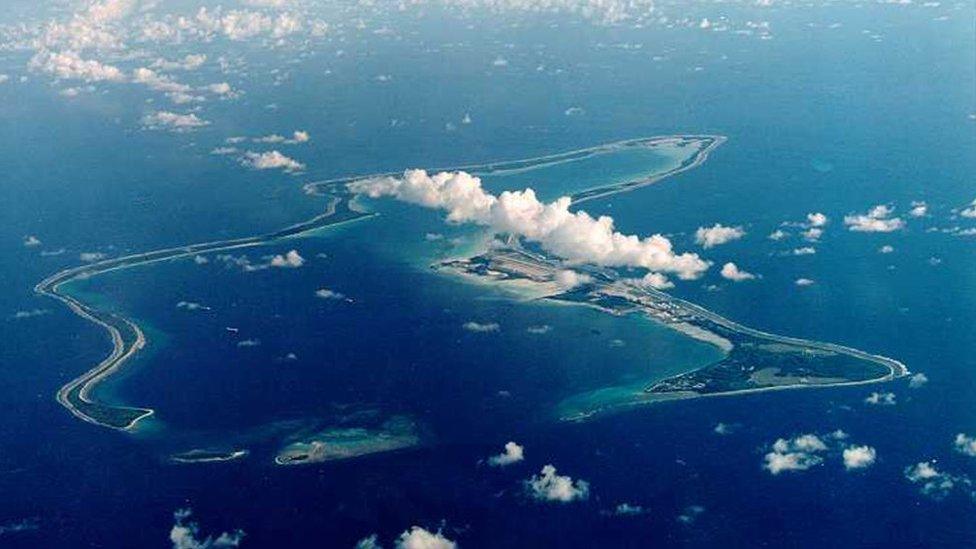Diego Garcia asylum seekers feel unsafe on remote British island territory
- Published
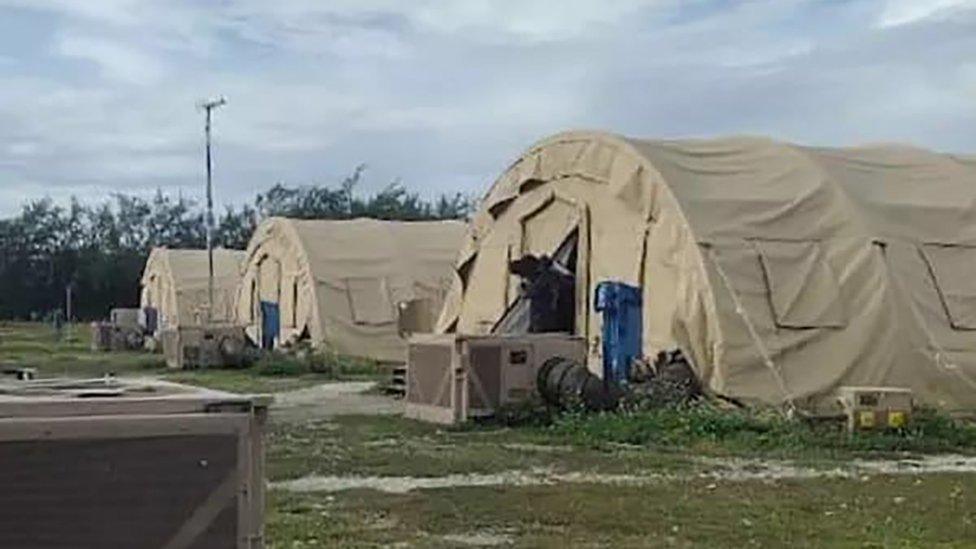
An image previously sent to the BBC by a migrant shows the housing tents on the island of Diego Garcia
A group of asylum seekers on an isolated British island territory have told UN investigators they feel unsafe and forgotten, as they reported sexual assaults and harassment of children, as well as self-harm and suicide attempts.
Inspectors from the UN's refugee agency visited Diego Garcia, in the Indian Ocean, to check on their welfare.
A draft report says that conditions there amounted to arbitrary detention.
The Foreign Office said the island was not suitable for migrants to live on.
Other than the migrant camp, the island is used as a UK-US military base. Thousands of troops are stationed there, usually on a one-year deployment, along with a smaller number of military contractors. For all allegations of sexual assault and harassment, the alleged perpetrators were other asylum seekers.
Civilian visitors are not allowed - and the island has officially had no resident population since the early 1970s when the UK relocated all the people living there so it could develop the base.
The 61 people currently in the island camp are mostly Sri Lankan Tamils and the first of them landed on Diego Garcia in October 2021 after their boat ran into trouble while trying to sail to Canada, according to migrants and officials.
Their subsequent asylum claims were the first ever to be launched on British Indian Ocean Territory (BIOT) - an area described as being "constitutionally distinct and separate from the UK", and where the UK government argues that the refugee convention does not apply.
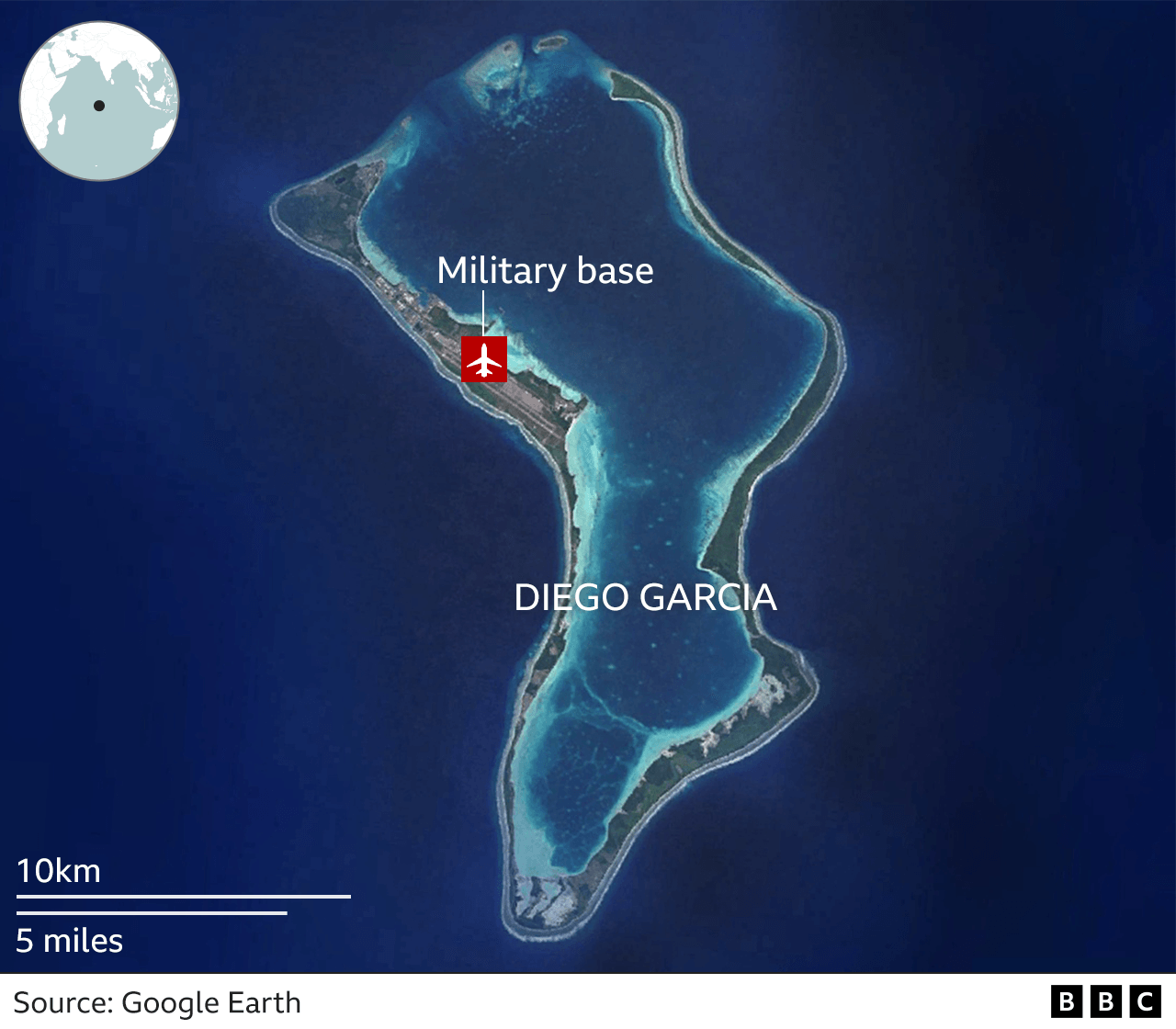
In its response to the UN report on the asylum seekers, a Foreign Office spokeswoman said: "BIOT is not a suitable location for migrants, which is why we have been working tirelessly to process the migrants' claims for protection and to find a suitable third country for those whose claims are upheld.
"At all times, the welfare and safety of migrants on BIOT has been our top priority."
UNHCR - the UN Refugee Agency - says the visit by its inspectors in late November marked the first time an "external party" had gained access to the island to monitor conditions there since the asylum seekers' arrival. The draft report it produced following its visit was released to the BBC by the supreme court of BIOT.
Sexual violence likely 'under-reported'
During its visit, UNHCR representatives heard several allegations of sexual assault and harassment, with alleged victims including young children. In all instances, the alleged perpetrators were other asylum seekers, the report says.
It adds that there was likely to be an "under-reporting" of sexual violence because of shame and stigma, and a view among asylum seekers that there would not be an effective response.
"It was clear from speaking to asylum seekers, both the general population and those who had made allegations, that they did not see anything to be gained by reporting, both in terms of justice and safety, including due to the fact that alleged perpetrators of sexual assault remain living in the camp alongside alleged victims," the report says.
A decision made last July to designate family tents and single male tents was a "positive step" but "unlikely to be sufficient as a prevention mechanism", it notes, adding that there was "little evidence of other preventive measures".
In the UN report, the asylum seekers on the island, which is hundreds of miles away from any other population, describe being bitten by rats in a fenced-off camp and say that they are only permitted to leave it under security escort, even if they just want to walk to the beach.
That has led to feelings of despair and incidents of self-harm and suicide attempts, the UN's draft report - one of the first detailed insights into conditions on the island - says.
The group of asylum seekers, which includes 16 children, said they felt bored, depressed, and hopeless. Some said they felt "forgotten", while one woman said: "Many of us think about ending our lives."
Some of the children told the inspectors they had witnessed violence and self-harm, and made multiple references to suicide during the UN visit, the draft report says.
Some of them recalled a time when a security dog came to visit the camp and they watched it through the security fence. "The children said that it made them sad that the dog was able to be outside the fence and they were not," the report says.
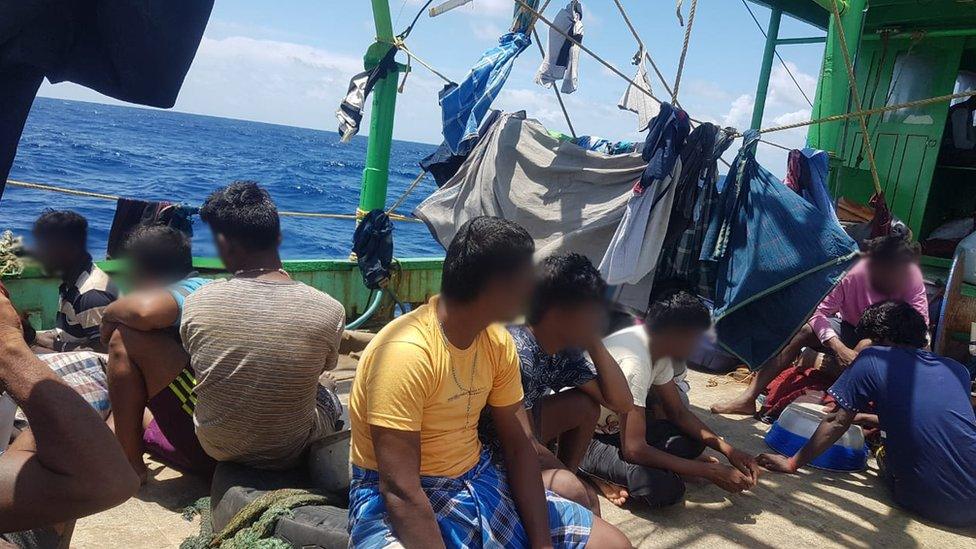
A photo, previously provided to the BBC, shows one of the groups of Tamils on their fishing boat, on which they intended to voyage to Canada
The asylum seekers do not have access to the internet and have never met their lawyers in person. Until now, details of the conditions they are being held in have been scarce - recounted mainly in court hearings in the UK.
A process has been established to determine if the group should be sent back to Sri Lanka or to a "safe third country".
The BBC last year established contact with multiple asylum seekers on the island, who described conditions there as hellish.
UNHCR says it considers that the 61 Tamils on Diego Garcia are "subject to deprivation of liberty".
"They reside in a closed place with no possibility to leave at will, which amounts to detention under international law," it explains.
In its report, the UN agency says the conditions on the island "fail to provide the necessary standards of privacy, safety and dignity".
The draft report says asylum seekers are held in a fenced area of approximately 100m by 140m, and are barred from leaving unless with a security escort. Most of the children have never left the camp other than infrequent visits to the beach under security escort, the report says.

The island of Diego Garcia is a British overseas territory situated 6,000 miles from the UK
The children showed UN representatives pictures they had drawn depicting the wired fence surrounding the camp and said their lives generally consisted of eating meals with their families, walking to the education tent for classes and then returning to their own tent.
"Living here is like living in hell," a mother is quoted as saying. "Children go to bed late and in [the] night do not sleep because they do not feel at peace. And that is because the children feel that we as parents are not at peace."
The asylum seekers are given three meals a day, and do not have the option to cook their own food. UNHCR observers found the meals to be varied and nutritional, but asylum seekers complained that the meals were sometimes not culturally appropriate, and that they had no say in what they ate.
'We think it may be better to die'
The UN report describes a deterioration in mental health in the camp, and observers saw signs of clinical depression and post-traumatic stress disorder.
The draft report says that while children in the camp appeared "playful and responsive" there were "worrying signs that living in an enclosed environment, in close proximity to adults who were suffering from poor mental health was having an impact on their emotional health".
"Children have witnessed violence and self-harm. They are aware that many of the adults, including in some cases their own parents, have tried to end their lives."
During the UN's visit, one teenage girl asked a UNHCR representative: '"Do you think that if I kill myself, my brother and parents could go to another country where they would have a better life?"
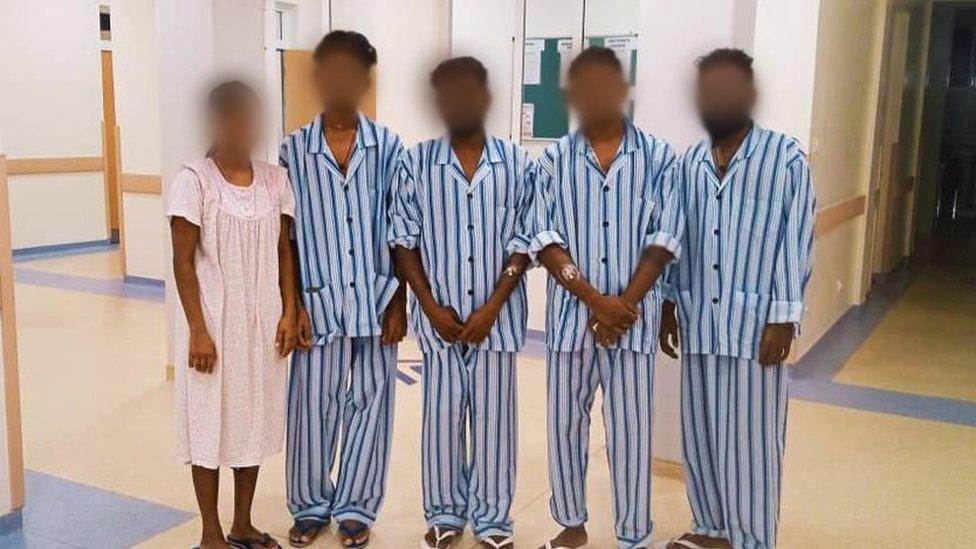
At one point, a group of the migrants were sent to Rwanda for medical treatment - some of them were later returned to Diego Garcia
Asylum seekers, including children, told the UN "they often feel their suffering is without end, and frequently consider the idea of purposely inflicting bodily harm or ending their life".
Medical services on the island reported 21 incidents of self-harm between May and October 2023.
"I feel I am alive on the outside but dead from inside. My body hurts me, and if the pains will further increase, I may have to hurt myself to end this all," one man said.
Several people have been transferred to Rwanda - a 3,000-mile flight away - for medical care following self-harm and suicide attempts.

If you are affected by the mental health issues raised in this story, the BBC Action Line provides support information here.

Those who have had their claims for international protection approved are still waiting for a third country - where they can have a new life - to be identified.
'Not a safe place'
UNHCR frequently heard concerns that asylum seekers felt they had been "forgotten" on the island and had "no way to speak up about their current conditions or perceived injustices".
The UN report acknowledges that the sudden arrival of asylum seekers on Diego Garcia presented "enormous challenges" and says "important efforts were pursued to ensure that those who wished to make international protection claims were able to do so" and that services such as medical care were made available. But, it says, the "existing situation is not tenable".
Its draft report calls for the asylum seekers to be "urgently relocated", for final decisions on international protection to be expedited, and solutions secured for those whose claims are approved.
It also calls for the UK government to conduct "contingency planning" for possible future arrivals on the island, and for an independent mechanism to be established to monitor the treatment of asylum seekers.
One of the group's lawyers, Tessa Gregory, from London firm Leigh Day, said she was "extremely concerned" about their wellbeing, describing conditions on the island as "appalling".
Lawyers had been denied access to visit their clients on the island, she added.
The UK took control of the Chagos Islands, of which Diego Garcia is part, from its then colony, Mauritius, in 1965 and went on to evict its population of more than 1,000 people to make way for the base.
Mauritius, which won independence from the UK in 1968, maintains the islands are its own and the UN's' highest court has ruled that the UK's administration of the territory is "unlawful" and must end. UNHCR says its visit to the island does not constitute recognition of BIOT.
Related topics
- Published11 June 2023
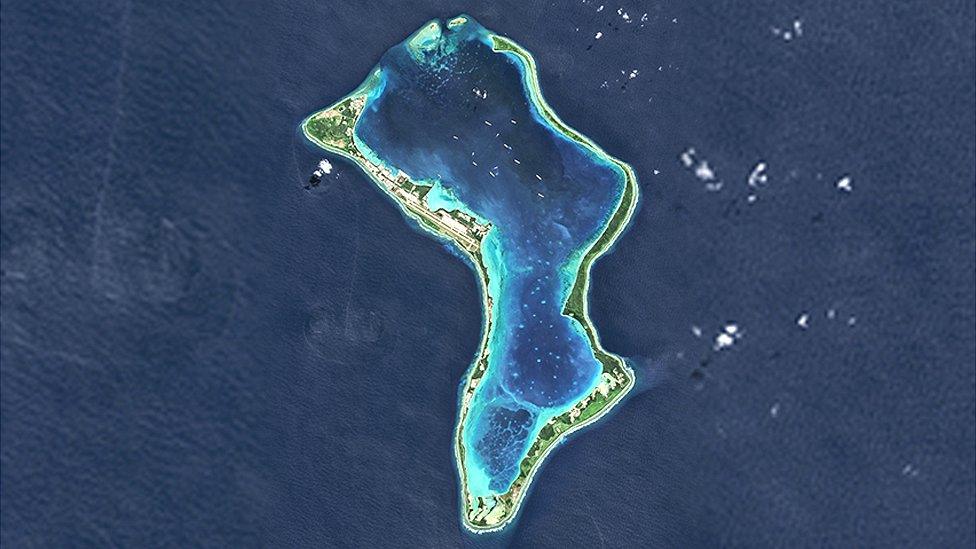
- Published3 November 2022
